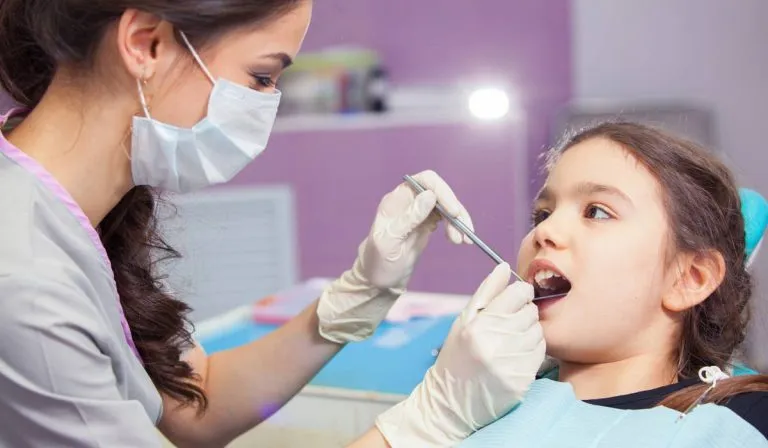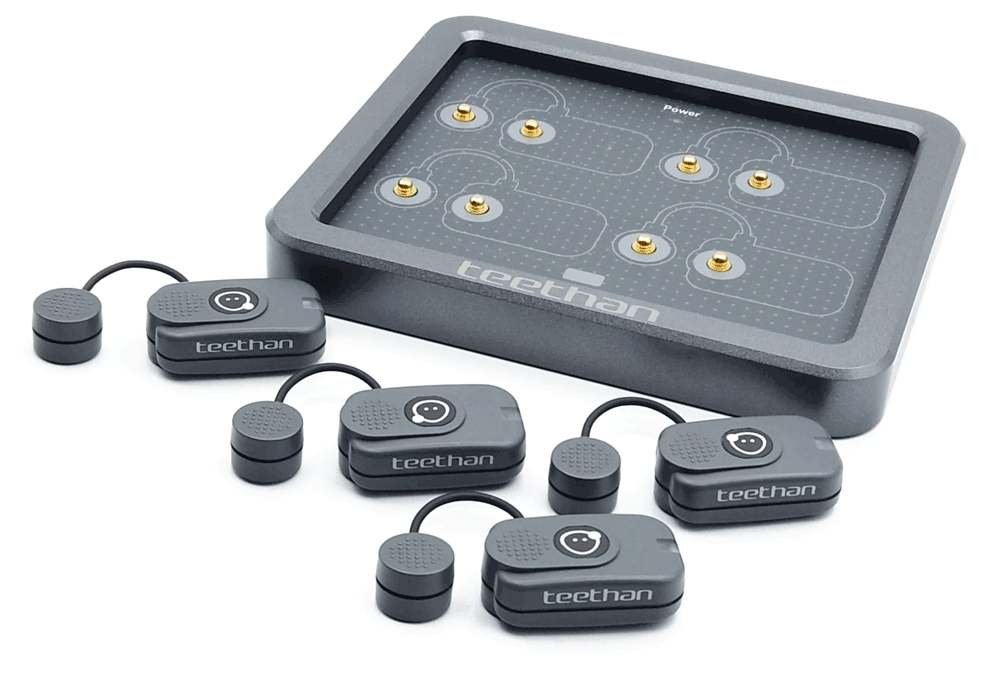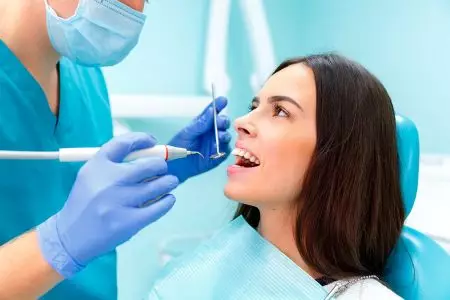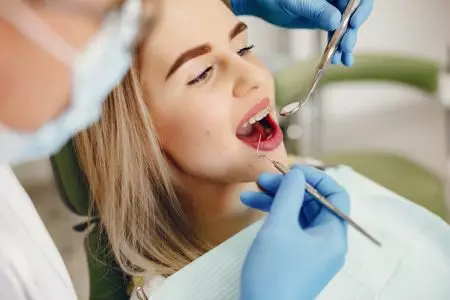- Bruxism: what it is, methods of treatment
- How to identify bruxism
- What are the dangers of bruxism?
- Diagnostic methods for bruxism
- Treatment of bruxism in a child
- Effective bruxism treatment for adults
- Advantages of contacting the Dent-House Family Dentistry Clinic
- How much does it cost to treat bruxism in Odessa?
- Frequently asked questions about bruxism
- Make an appointment
- Specialists
Bruxism
Bruxism is grinding your teeth in your sleep
Bruxism - grinding your teeth in your sleep
Symptoms of this condition include frequent morning headaches and migraines, earache, discomfort in the joints of the jaw, tooth sensitivity, and the chewing surface of the teeth becoming unnaturally flat, as if they were cut flat. These symptoms are caused by overstretching of the masticatory muscles, their uncontrolled spasm, which leads to grinding. Teeth rubbing against each other in sleep, prematurely wear out, break and decay.
Reasons
Heredity, malocclusion, sleep disorders, stress, nervous tension, fears, emotional trauma, various forms of depression.
In children, the main cause of bruxism is the period of jawbone growth and tooth renewal. Teeth grinding in young children is sometimes attributed to parasites (worms), but it is a physiological process until the permanent dentition is formed. Most often paediatric bruxism occurs with the appearance of the first front teeth or with the appearance of permanent teeth around the 5th-7th year of life. It usually goes away as they get older.
Indications
- involuntary grinding
- morning headaches and migraines
- masseter muscle pain
- earache
- discomfort in the joints of the jaw
- tooth sensitivity
- the chewing surface of the teeth becomes unnaturally flat
Preliminarily
Course of the procedure

To protect the enamel in bruxism, a special mouth guard is made to protect the teeth and prevent spasm of the joints and muscles. This personalised mouth guard is placed in the mouth before going to bed, it can also be used during the day (in stressful situations or in case of nervous tension).
Equipment

The Teethan® Myograph consists of four wireless EMG sensors with active electrodes, unique in its kind due to its light weight, compact size and accuracy of the data obtained. The method is completely non-invasive for the patient, the sensors are fixed via disposable gel electrodes to the surface of the masseter muscles, the measured data are transmitted via Wi-Fi to a receiver inserted into the USB port of a computer. By performing two tooth compression tests (with and without cotton rolls), each lasting 5 seconds, it is possible to obtain basic indicators of the state of the bite: symmetry, centre of gravity, assessment of overall muscle work, assessment of jaw rotation.
Bruxism: what it is, methods of treatment
What is bruxism? Many people are familiar with this condition, but do not know its name. Bruxism is the grinding of teeth in sleep. However, it is not caused by parasites, as we all tend to think. It is a more serious condition that requires treatment. To cope with the disease will help specialists of The family dentistry “Dent-House” clinic in Odessa. The doctor determines the price of treatment during consultation individually.
How to identify bruxism
Bruxism is easy to recognise because teeth grinding is very audible to others. It is caused by a spasm of the chewing muscles. The jaws clench and the teeth rub against each other, resulting in a characteristic sound.
Bruxism can occur in both children and adults. In children, the condition is most often associated with jaw bone growth and tooth renewal. Usually, teeth grinding goes away on its own. In adults, bruxism is caused by stress or psychological problems. Sometimes stress comes out in a similar way in children.
Bruxism can be a consequence of epilepsy, enuresis, chronic runny nose or apnoea.
The condition also sometimes develops as a result of dental problems – improper bite, jaw joint disease, improperly fitted braces or dentures.
The person himself does not hear that he grinds his teeth during the night. However, bruxism may be indicated by such causes:
- jaw pain or numbness;
- increased tooth sensitivity;
- ringing or pain in the ears;
- headache, feeling woozy upon waking;
- toothache;
- crunching or clicking of the jaw.
Mostly the symptoms appear in the mornings, just after waking up.
What are the dangers of bruxism?
Bruxism is a condition that can hardly be called harmless. It has the following consequences:
- abrasion of the enamel, the surface of the chewing teeth;
- constant tone of the jaw muscles;
- the development of tooth decay;
- enamel cracks;
- loosening of the teeth;
- bite disorder;
- damage to the soft tissues of the oral cavity;
- insomnia;
- narrowing of the airway.
It is very important to recognise bruxism in time and start its treatment.
Diagnostic methods for bruxism
If you suspect bruxism, see a dentist. The dentist will take a medical history and perform an external examination. Additional examinations may also be ordered to determine the cause of the condition.
At our Dent-House Family Dentistry Clinic, we use the Teethan Myograph for diagnosis. It is a modern device that allows us to examine the muscles and peripheral nerves of the jaw apparatus. Diagnosis takes less than a minute. During the time of myography, the teeth are compressed and the bite, symmetry, centre of gravity, evaluation of the muscles and the state of the jaw are fixed. The price of the procedure is 2000 UAH.
Treatment of bruxism in a child
Usually the treatment of bruxism for children begins with the elimination of the causes of the condition. This may be physiological or psychological therapy. The doctor may also prescribe vitamin preparations or remedies that normalise sleep.
A dentist gives the best advice for the treatment of bruxism. If the condition is not caused by dental problems, it is dealfor other doctors. If necessary, children over 10 years of age are offered special mouthguards, which are fitted before bedtime. They separate the teeth and help to relax the muscles of the jaw.
Effective bruxism treatment for adults
Bruxism of adults must be treated. Depending on the causes of the disease, the following methods are used for treatment:
- Sleep mouthguards. Disengaging the jaws and relaxing the muscles is, in most cases, the fastest and most effective way of treatment.
- Drug therapy. These are drugs to relax muscles and normalise sleep.
- Physiotherapy. Going to an osteopath, massage, manual therapy helps to get rid of spasm.
- Psychotherapy. Helps in case of stress, depression.
- Dental treatment. Required in case of tooth and gum disease.
As in the case of children, the doctor will always suggest the use of a special mouth guard. It is customised in our technical laboratory at the clinic.
Advantages of contacting the Dent-House Family Dentistry Clinic
Many residents of Ukraine specifically come to Odessa to visit the Dent House family dentistry clinic. This is not surprising, as we offer:
- a wide range of services – caries treatment, whitening, crowns and much more;
- high quality service;
- state-of-the-art equipment;
- plan oftreatment in several price options;
- individual approach to each patient;
- the opportunity to visit the dentist for a large family at the same time;
- absolute sterility.
Our patients are seen by doctors with extensive experience who will help solve any dental problem. The clinic is always open for new visitors!
How much does it cost to treat bruxism in Odessa?
The cost of bruxism treatment is determined individually. The price depends on many factors – the age of the patient, the condition of the teeth, the treatment used. An orthodontist can help you with only a mouthguard or full bite correction. The exact amount will be announced by the doctor after a consultation.
You can find out in advance how much bruxism treatment costs at our Dent-House clinic. To do this, please consult with the receptionist by phone. Prices for services, reviews, treatment methods you can see in special sections. Online appointment is also available.
Frequently asked questions about bruxism
🦷 What is bruxism and how to cure it?
- Excessive tooth compression due to prolonged stress or disturbed dento-jaw relationships.
- Treatment: mouth guards and deprogrammers.
😁 What symptoms are indicative of bruxism?
- Muscle stiffness after eating and after sleeping.
- Teeth grinding during sleep.
🦷 What methods are available to treat bruxism?
- Split therapy.
- Subsequent orthodontic treatment.
Make an appointment
Specialists

Molochny Andrey Sergeyevich
Dentist-orthodontist




